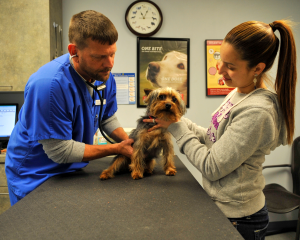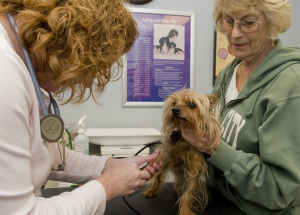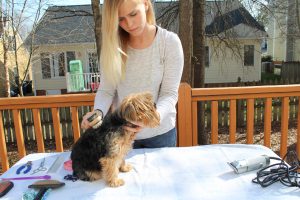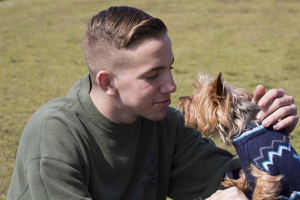How long do Yorkies live? This is one of the most commonly asked questions I receive from people who are considering adding one of these lovable dogs to their family.
The Yorkshire Terrier has a longer life expectancy than many other breeds. In the U.S., the average household dog lives for about 12.67 years, but Yorkies live an average of 12-15 years, with females typically having a longer lifespan than males.
Yorkshire Terriers are generally a hardy and healthy dog. Most of the common health issues that are seen in this breed are treatable, and not life threatening. This is one of the reasons why Yorkies have a higher than average life expectancy. Toy breeds also live longer than medium-large breed dogs in general!
In this post we are going to discuss the leading causes of death in a Yorkshire Terrier, and some ways that you can help give your pup the best, and longest life possible!
Leading causes of death in young Yorkies.
 Yorkie puppies between the ages of 1 and 2 years old have two leading causes of death. The first leading cause is getting infected with a disease, and the second is trauma, which is also a cause of death for adult Yorkies as well.
Yorkie puppies between the ages of 1 and 2 years old have two leading causes of death. The first leading cause is getting infected with a disease, and the second is trauma, which is also a cause of death for adult Yorkies as well.
Let’s take a look at the most common infectious diseases that can cause premature death in a Yorkie puppy.
Parvovirus and Distemper
Parvovirus (Parvo) – This disease wreaks havoc on a puppy’s gastrointestinal tract and immune system. It causes severe vomiting and diarrhea which can lead to extreme and fatal dehydration. This disease is incredibly contagious.
- How does a puppy get this? Sometimes a puppy can be exposed to Parvovirus between the time that immunity from his mother’s milk is no longer being received, and before his first vaccination against has time to take effect. This disease can spread very easily from an infected dog, or from an infected dog’s feces.
- How can it be prevented? Proper cleaning in a puppies environment, and early preventative vaccinations are imperative for protecting against this disease.
Distemper – This is an infection of the respiratory and/or gastrointestinal tract. It presents itself with symptoms such as: coughing, sneezing, and general weakness, but can progress into intense diarrhea and vomiting which will cause dehydration. If this disease is not treated quickly and aggressively, it can move into the spinal cord, and then the brain of a puppy causing seizures, and trembling, and death.
- How does a puppy get this? A puppy gets this from coming into direct contact with an infected dog’s: Urine, blood, or saliva. It can also be contracted from sharing a contagious dog’s food/water dish, or being sneezed or coughed on by the sick dog.
- How can it be prevented? There is also a vaccination against this deadly disease. A Yorkie puppy will likely have had its first Distemper shot before you own him/her. It is important to refrain from taking your new friend out on public outings around other dogs, or environments where this virus could be living, until he has received the full first round of puppy shots. (usually around 12-16 weeks old) Regularly cleaning and disinfecting your home (or kennel) can also help to ensure that the virus is not lurking around in a puppy’s living environment.
Trauma – The second leading cause of death in young Yorkshire Terriers is Trauma, and it is also the third leading cause in an Adult Yorkie.
Almost 11% of Yorkie deaths are due to fatal injury to the head, body or both. It is devastating that this is such a high cause of death in Yorkies when it can, most of the time, be prevented with simple safety measures put into place.
Some examples of how these injuries occur are as follows:
- When someone accidentally steps, or falls on a Yorkie.
- Accidentally kicking, or tripping over them.
- Dropping them.
- Accidentally knocking them down stairs.
- Being hit by a car.
- Injuries occurring from a car accident while they were riding.
Later in this article, we will talk about ways to help reduce the risk of your Yorkie being fatally injured in these ways.
Leading causes of death in adult Yorkies.
 The top four leading causes of death for Yorkies over 12 months in age are: Respiratory disease, Cancer, Trauma, and Congenital disease.
The top four leading causes of death for Yorkies over 12 months in age are: Respiratory disease, Cancer, Trauma, and Congenital disease.
1. Respiratory Disease – Cause of death for 16.1% of Yorkies. This can be in the form of:
• Brachycephalic airway syndrome – A series of upper airway abnormalities which makes it difficult for the dog to inhale. If this is left untreated it can cause inflammation to the airways and problems with the heart.
– Obesity worsens the symptoms of Brachycephalic airway syndrome. If your Yorkie has this syndrome, help him maintain a good weight by giving him low-stress exercise and a healthy diet. Heat and Humidity also aggravate the symptoms, so keeping the dog inside an air-conditioned home on these especially hot days is a good idea.
• Collapsed trachea – A gradual and progressive weakening of the tracheal rings. This is a common condition for toy breeds, and is not typically life-threatening, but it can be if it is severe, and left untreated.
– Collapsed Trachea can be made worse/caused by using a traditional collar instead of a harness. Traditional collars put unnecessary stress on a dogs neck area, and toy breeds especially have weaker tracheas that are susceptible to collapse. *Read more on this condition, and learn about the harnesses we recommend for small dogs here.*
• Pulmonary Fibrosis – This is when the normal tissue in a dog’s lung is replaced by scar tissues. This leaves very little normal lung capacity for daily activities. It is unsure why this happens to some dogs, but it is thought to be caused by an abnormal healing process following a lung injury. It is also suspected that genetics plays a role in a dog developing Pulmonary Fibrosis.
2. Cancer – Cause of death for 11.2% of Yorkies. Common Cancers that are seen in Yorkies are:
- Lymphoma – Tumor in the lymph nodes
- Mast cell tumors – Type of skin cancer
- Mammary gland tumors – (risk can be lowered dramatically if a female is spayed. Especially if it is done before her first heat cycle.)
- Bone Cancer
- Soft Tissue Sarcomas – Appear on the surface of the body, and develop within organs internally.
Cancer is scary and unpredictable, and can seem to appear out of nowhere. The good news is that 50% of all cancers can be cured if it is caught in the beginning stages. Be sure to check your pet over, at least once a month, for any new lumps or bumps, or skin lesions that aren’t healing well, just like you would on yourself. Pay attention to any odd behavioral changes as well, or signs of illness such as: vomiting, diarrhea, loss of appetite, lethargy, etc.

If you notice anything suspicious at all, take your pet to your veterinarian as soon as possible to get checked out. The earlier cancer is diagnosed, the better your dog’s chances are of beating it!
3. Trauma – Cause of death for 10.7% of Yorkies. See examples of fatal trauma events that could happen to your Yorkie above. – Under the “leading causes of death in young Yorkies.”
4. Congenital Diseases – Cause of death for 10.5% of Yorkies. Congenital diseases are those that are present at birth. The most common and sometimes fatal Congenital disease that a Yorkie may be born with is:
- Portosystemic shunt (PPS) – This is a liver shunt that does not allow adequate blood supply to be delivered to the liver. This blood bypasses the liver, and therefor toxins are not filtered out of the blood, and these toxins flow to other parts of the dog’s body, including the brain. Moderate to severe cases should be treated with surgery. Very mild cases can be treated with a low protein diet, and medication, but unfortunately, it will still reduce the life span for your pet if surgery to fix the condition is not performed.
- – In the US, Yorkshire Terriers are 36 times more likely to develop liver shunts than all other purebred dogs combined. It is important to know the symptoms of this disease so that it can be diagnosed and treated quickly. Even though a dog is born with this condition, it is possible (although unlikely) that symptoms will not become obvious until after the dog’s first birthday.
A little note on Teacup Yorkies.
 Any Yorkie that is specifically, and purposefully bred to be smaller than three pounds is typically given the title of: “Teacup Yorkie.” However, Teacup Yorkies are not recognized by the AKC. They are simply the offspring of two very small Yorkies that should not have been bred together, but was purposefully done anyways in effort to produce teeny tiny Yorkie puppies.
Any Yorkie that is specifically, and purposefully bred to be smaller than three pounds is typically given the title of: “Teacup Yorkie.” However, Teacup Yorkies are not recognized by the AKC. They are simply the offspring of two very small Yorkies that should not have been bred together, but was purposefully done anyways in effort to produce teeny tiny Yorkie puppies.
This is neither a responsible, or safe breeding practice. Yorkshire Terriers that are under three pounds at their adult weight are prone to several health issues, and typically have a significantly shorter lifespan than that of a properly bred, and healthy sized Yorkie.
Though it can be tempting to purchase a dog from a breeder who advertises “micro Yorkies,” PLEASE heed my advice, and do not get sucked in by the “cuteness” of too tiny Yorkies. I can assure you that you will be at the vet for numerous health conditions, and you will not have the privilege of enjoying your pup for 12+ years to come.
A well-bred and healthy Yorkie is still adorable and tiny, so let’s not endorse them being even tinier than they should be!
Tips to help give your Yorkie the long life he or she desires to spend with you!
Although some illnesses are impossible to completely prevent, there are still helpful steps that Yorkie owners can take in order to give their pet the best and longest life possible.

1) Exercise – Yorkies may be small, but they still need an outlet for burning their energy! Yes, they may be able to get most of their exercise by tearing around the backyard chasing birds and squirrels, but it doesn’t satisfy their inner desire to walk and explore! All dogs enjoy walking. It is great not only for physical stamina, heart health, and keeping them from becoming overweight, but it is hugely beneficial to their mental and emotional health as well. Dogs can become depressed, lazy, or stir crazy, just like people! Get them outside, and let them explore their neighborhood. Daily walks are ideal, for 15-25 minute intervals. If you can squeeze in two walks per day, that would be great, if not, one will do.

2) Diet – I cannot stress enough how important a healthy and well-balanced diet is for your dog. Feeding a nutritious food from the very beginning can literally add years to a dog’s life, and save you money in vet bills! Choose wisely when picking a commercial food for your Yorkie, and if you have time, you could even try making your own food to give to your dog. Unfortunately, we live in a day where everyone is busy. busy. busy. For this reason, I have created a post on my top recommended commercial dry dog foods for Yorkies, to make the diet decision easy for you! You can check out that post here, or if you’re in a hurry, here are our top picks in the Amazon link below!
3) Vaccinations – It is important to stay up to date with your dogs vaccinations to prevent diseases. Keep your new puppy at home and in his own yard as much as possible until he has finished his first round of puppy shots. Keep a close eye on him even in your own yard to be sure he is not getting into any wild animal urine or feces. If you must take him out, bring him along in a carrier, or a doggy stroller, to protect him from other dogs, and environments that could pose a risk of infection for your puppy. I have created a post all about our top doggy stroller recommendations here!

4) Yearly vet check-ups and sick visits – Make sure you bring your best friend in for yearly check-ups where the Vet could see something that you have missed, and do not hesitate to bring your pup in for a sick visit if anything seems abnormal with his behavior or appearance. Early diagnosis can be the difference between life and death with some illnesses!
5) Spay or Neuter – The majority of vets agree that spaying or neutering your pet can lengthen their lifespan. It helps prevent, or completely eliminates the risk of certain cancers in both males and females. A female that is spayed around the 6-month mark (before her first heat cycle) tends to live 25% longer than females that are not spayed. Males that are neutered around the 6-month mark tend to live 20% longer than an intact male.

6) Grooming and Dental care – Keeping a Yorkie well groomed: Ears cleaned, nails trimmed, bathed, and especially keeping their teeth clean, are all very beneficial to their overall health. Dirty ears can lead to ear infections, long nails can lead to issues with walking, and a dirty dog in general can lead to skin and coat problems including: infections, dandruff, parasite infestations, hair matting, and general discomfort. A comfortable dog is a happy dog. *To learn how to give your dog a low maintenance cut yourself Click Here*
– Dental care is extremely important to your Yorkie’s health. Unfortunately, Yorkies are prone to having issues with their teeth. If the teeth are not cleaned and taken care of, tartar will build up, and infection can set in. The infected tooth/teeth will begin to decay, and a decaying tooth can and will spread infection into other parts of the dogs body. It can even reach the dog’s heart and brain. You can see how this can cause an incredible amount of pain for a dog, and can surely be life threatening if there is no medical care. Furthermore, dogs that end up losing their teeth due to these issues, have a very hard time eating, and that can make for difficult, and stressful senior years.
Take the time to spend 5 extra minutes each day to brush your dogs teeth with a doggy toothbrush and toothpaste. It is a great investment into your dog’s happiness and health. Even if he doesn’t think so. 😉
7) Preventing Trauma – It is so sad that almost 11% of Yorkies lose their lives due to accidents that can, in most scenerios, be prevented. Here are some tips to help avoid an accident like this, and create a safe home and lifestyle for your pet.
– Be aware of your steps at all times, and make sure all other family members and guests do the same. Yorkies are extremely loyal, and love to be where you are at all times. Their small size makes it easy for them to get under your feet at just the wrong moment. For this reason, it is imperative that everyone in your home is super cautious with their steps, always looking for the dog before they make a move which could potentially hurt the dog. Move slowly in a dark room where you cannot see the dog as well, and always look before you sit or lie down to make sure you are not landing on your dog’s napping spot. My dog likes to nap on top of, or behind the throw pillows on the couch, so I always have to check around them before I decide to plant myself down for a movie!

– Being a small dog, people tend to want to pick Yorkies up and hold them. This isn’t a bad thing in itself, I hold my Yorkie often, but care needs to be taken to hold them properly, and to let them get down if they start to become restless and wiggly. A fall can have devastating consequences for this small breed. It is best to not let small children pick up a Yorkie at all, as it is nearly impossible for them to catch the dog if it decides it is done being held. Teach your kids to have gentle hands with your dog, and to get down to his/her level if they want to give affection. If other kids are visiting my home, I put my Yorkie away either behind a gate in another room, or in her crate. So that both the children, and my dog are safe.
– It can be tempting to let your Yorkie sleep in bed with you, but it is better for the dog to sleep in his or her own bed, or crate at night to prevent them from getting rolled over on, kicked, or hit while you are asleep. I let my dog spend time with me in bed at night before I go to sleep, so we can cuddle, then I put her in her own bed when I am ready to go to sleep.

– Keep an eye on your dog if he/she is out taking a romp in the fenced in yard. Make sure that they are not playing Houdini and planning an escape. Intact dogs especially like to try to roam the neighborhood searching for a potential mate. It is also important to be sure that no wild animals, or other dogs, are able to get to your dog and potentially harm them. My vet has personally seen a Yorkie that was almost killed by a hawk in its own backyard when the owner was not watching.
– Invest in a good doggy car seat like this one. Having your dog safely secured in your car while you travel can prevent serious injuries, and could even save their lives in the event of an accident. Don’t text, or post photos of your adorable Yorkie on Instagram while you drive either. 😉 Seriously though, it can wait!
– Do not let your pup outside without a leash. (unless in a safe enclosed area) Getting hit by a car is one of the top reasons why a Yorkie dies from trauma. It happens so fast, and it is better to just prevent it with a leash, even if you trust your dog not to run. If your dog is a door scooter, meaning they scoot right out the front door as soon as you get home so they can see you, consider getting a baby gate and keeping them in an area of the house where they do not have access to the front door if you or someone else opens it. If you do not have a good place for a gate, then be extremely careful every time the door is opened, and scoop your dog up if you can to prevent them from running out.
*Note* – Teach your dog the basics commands: Sit, Stay, Come, etc. If your dog knows these well, it could potentially save her lives in a dangerous situation.
Senior Yorkie Care
A Yorkie is considered a senior when he/she is about 10 years old. Old age signs may come sooner, or later with each individual dog, but typically by 10 years you should be transitioning into a little bit different care for your older pup. A senior dog can still have many years left of happiness spent with you, but there are a few changes that you should begin to make to keep them comfortable and lovin’ life.
- Exercise – An older Yorkie will still need exercise to keep him/her healthy, but he may not be able to go for those really long walks anymore. When you’re dog starts to slow down in his older age, pay attention to these signals and be mindful of them. Take your pup for walks still, but shorten the time, slow down the pace, and go in directions with fewer hills. Keep the same daily exercise, just reduce the strenuous exercise! If you are still wanting to go on long walks then a doggy stroller, like I mentioned above, would come in handy for this time as well! Have your dog walk for 15 minutes or so, at a steady pace, and if he starts to get tired, pop him in his stroller so he can still enjoy the outdoors, but be able to rest for the ride. Below is a link for one of our favorite stroller options for senior dogs.
- Hydration – An older dog will need to drink more often when exercising, spending time in heat and humidity, or when traveling. Be sure to stop more often and let your dog quench his thirst.
- Temperature – Senior Yorkies will be even more sensitive to extra cold or hot temperatures. Make sure you have a doggy sweater, or coat on hand for the cold days, and plenty of water, shade, and maybe even a cooling vest for the hot and humid days. If your Yorkie is still acting stressed being out in the cold or heat, let them go inside and rest in a comfortable environment.
- Bedding – It would be wise to invest in a comfortable orthopedic bed for your senior Yorkie, so that he has maximum comfort while resting. Many senior dogs live with arthritis, and an orthopedic dog bed can really help those achy joints. I have put a link for our top pick below. This bed has amazing reviews, and there are matching blankets, and replacement covers that you can also purchase for the bed!
- Supplements – There are a few supplements that we recommend that may be helpful for your senior dog, but honestly, these supplements can be taken at any time. You do not necessarily have to wait until your dog is a senior. Older dogs do tend to develop a thinner and sometimes more coarse coat. This can be due to dry skin. An Omega 3 supplement can help with this. Another supplement that I really like in general, that your Yorkie could take at any age to benefit their health is Dinovite. Here is a quote from the website stating what Dinovite is – “Dinovite is a nutritional supplement made with whole food ingredients that contain vitamins, minerals, enzymes, direct fed microbials and fatty acids that can be missing from your pet’s diet. It can help support the immune system, digestive function, healthy skin and a shiny coat!” Click here to visit www.dinovite.com There are other great supplements, but I have had personal experience with those two and have been happy with the results. A senior dog that is dealing with arthritis could greatly benefit from a supplement specifically geared towards helping with achy stiff joints as well.
- Lifestyle – The lifestyle of your senior dog should be kept fairly consistent and easy going. Remember, your dog is in “retirement mode.” He wants to relax in his favorite places, stay active with moderate exercise, and enjoy plenty of quiet time and rest. Try to keep your Yorkie’s routine very similar every day, and keep the loud noise and commotion down to a minimum. Treat him to a comfy orthopedic bed, and keep it in the same place for him at all times so he knows exactly where he can go for his downtime. In general try to make life comfortable and easy for him, so he will not become stressed or confused.
– Be sure to check your Yorkie over often for any signs of illness, and plan for a few yearly trips to the vet, to make sure he is fairing well in his old age. All of these things can help aid in a happy and long life for your pal, and allow him to have the best senior years he could ever imagine. 😉
Long live your Friendship.
 Our dogs look to us for just about everything… their care, comfort, and protection. In return, they try their best to do the same things for us, and give us their unwavering, unconditional love. Of course, you want your friendship with your pup to last forever, and even though we will inevitably have to say the dreaded goodbye to our beloved pet at some point, it is important to do everything we can to give them a happy, healthy, and long life, so we can make as many wonderful memories as possible.
Our dogs look to us for just about everything… their care, comfort, and protection. In return, they try their best to do the same things for us, and give us their unwavering, unconditional love. Of course, you want your friendship with your pup to last forever, and even though we will inevitably have to say the dreaded goodbye to our beloved pet at some point, it is important to do everything we can to give them a happy, healthy, and long life, so we can make as many wonderful memories as possible.
“A dog doesn’t care if you’re rich or poor, big or small, young or old. He doesn’t care if you’re not smart, not popular, not a good joke-teller, not the best athlete, nor the best-looking person. To your dog, you are the greatest, the smartest, the nicest human being who was ever born. You are his friend and protector.”
Louis Sabin, All About Dogs As Pets
 Have a question about your Yorkie? Ask away in the comments section below. Willow and I will be sure to get back to you personally! 🙂
Have a question about your Yorkie? Ask away in the comments section below. Willow and I will be sure to get back to you personally! 🙂

– Save this information for later, and help us spread the word by pinning this post to Pinterest!
Hover over or tap the photo to see the Pin it option.
To read all about the health issues that Yorkshire Terriers are prone to Click Here.
Does your pup suffer from severe itchy skin? One of these shampoos might help! Check it out!


Very nice website very informative and detailed. Learned somethings about dogs, I did know that dogs are very faithful and they do guard their owners. All the best for the future
Thank you, I am glad you learned something. 🙂
Same to you!
Sarae
I truly enjoyed your article on How long do Yorkies live? You answered the questions that I have been wanting to ask. Then explained answers to a few other questions that I had like how dogs get parvo virus, I was unaware. Furthermore provided methods to avoid this terrible disease. Thanks for sharing this valuable information. I have huskies, these remedies can be used for them too.
Yes! Many of the preventative tips can be applied to all dog breeds for sure. 🙂 I am glad you found this post helpful.
Hey! 🙂 Your website is amazing. It was very informative as well. I had never even heard of some of the causes of deaths for Yorkies. I also didn’t know they made car seats for dogs so that’s very interesting.
I am glad that it was helpful for you! Yes, there are many options for car seats these days and they are very helpful for keeping your pup safe. 🙂 Thanks for stopping by!
Oh Sarae, Yorkies are ever so adorable that it breaks your heart to think that one day they will no longer be with you … especially when prematurely. I have a Border Terrier, which is deemed to be an equally sturdy breed. And I have to say that I agree with you, in so far that your dog in your lifespan is bound to get ailments in the same way as us humans. But, especially when illnesses are caught in time, and given the advanced development in veterinary science, dogs can get over them with the appropriate medical intervention. My Border has had cancer twice, but is still with us at his golden age of 14 – and still live and kicking. It very much sounds like Yorkies are very similar to Borders: slightly different size, similar temperament.
One last thing I wanted to add. Thank you for warning us about Tea Cup Yorkies! Very scary business, especially if you think that people may be attracted by the fact that they are indeed extremely cute. As a dog owner, I could scream my lungs out, when I hear about unethical breeding habits. This is not only damaging for us dog owners, but for the dogs themselves. And it’s not fair at all.
Thank you for your comment! Wow, that is amazing to hear that your Border Terrier has beaten cancer twice!! Good for him, and good for you for catching it early, and getting him medical care quickly!
Yes, it is truly unfortunate when breeders practice iresponsible breeding just to gain an extra buck. It is sickening, and I hope to help people realize the damaging effects that “micro breeding” can cause in the health of any breed!
Wow! Yorkies have a long lifespan. My mutt recently was euthanized at 17 years of age, but that was really an unexpectedly long life. I think my next dog will be a Yorkie. I hate going through the grieving process after a pet passes. A dog with a long lifespan will cut back on the number of times I need to do that.
Wow, 17 is a very long time for a dog to live! It is so very hard to go through a loss. Non purebreds do tend to have a longer lifespan than purebred dogs, but Yorkies have a great average lifespan, and you can be sure to enjoy every year you spend with this adorable breed! 🙂
Our oldest Yorkie lived to almost 18 years. The last three months of her life her organs just started failing. One of the reasons she lived so long, according to the vet, was that we always fed her premium dog food and always dry. One of the problems we have faced with our Yorkies is we have never been able to completely train the to potty outside. I think their little bladders are so small they just cannot hold it like a bigger dog can. You should write a post about that. Anyway, love your site and I keep coming back to it.
Wow! So amazing that she lived that long! I hope my pup does too. 🙂 I do have one post about easier potty training for yorkies! You can find it here… Easier Potty Training But, I’d like to write more about potty training for sure. I am so glad you enjoy the site. Thanks for stopping by!
Sarae
I also have a dog, his name is Dante and he is a cavalier one year old.
I can tell you that I am from this article, which is a comprehensive and professional, really learned a lot. Especially I was surprised at how important is dental care and grooming. I hope my Dante will get some benefits from your post.
I am so glad you found the post helpful. Thanks for stopping by. 🙂